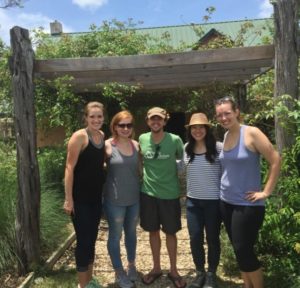by Kaylyn Schultz
I’m a big believer in the idea of “loving where you live”. Not just ‘liking’ where you live but loving it—loving the city, its spirit, and its people. Loving on the people (those amazing fellow Wacoans) and helping out those people in any way one can—whether it be mighty and life changing or the little everyday random acts of kindness. This summer I had the incredible opportunity to help our city and some of its people in my own way. It was a blessing and a wonderful, eye-opening experience. I was given an internship at the Waco-McLennan County Public Health District.
Now I saw pictures of some of the more exotic places my friends went off to for their internships (*cough cough* HAWAII.) and may have sighed once or twice with longing after that more glamorous summer life. However, staying in Waco, Texas, was definitely the best fit for me and for a couple reasons. One, I had to take a British Literature class and being in the same city as your class is usually a good plan to accomplish said class. And two, I really wanted to learn what my city and its people needed from a health standpoint. Let me tell you: I got a good picture.
I got to work on a few projects in my internship. I was in charge of running all social media platforms for the Health district (Cue shameless plug. Go ‘like’ the Health District on Facebook!) and updating their website for Live Well Waco (check that one out too. It’s pretty awesome). I got to have so much fun and learned a ton about reaching out to people and getting their attention. I was also a part of the Health district’s Our Children, Their Nutrition team. This program, OCTN, was created to bring nutrition education to children ages 8-12 years old. This is a crucial age and we want them to be armed with a full arsenal of nutrition knowledge so they may make the smartest choices concerning food. We taught kids detailed nutrition information and tips like the amino acids in protein, the different kinds of carbohydrates and fats, and to check the color of their urine in order to see how hydrated they are! [That last one really seemed to stick with them all for some reason!] I was also fortunate enough to help out with the 8 Week Zumba Challenge!—I have consequently discovered that I really love Zumba and want to become an instructor. I gave a short nutrition lesson before the workouts started and tied in how these parents can take it home to their kids and stop poor dietary habits before 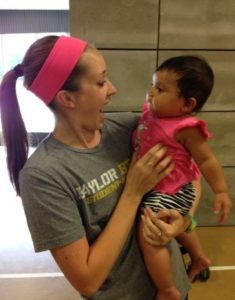 they begin. I also got to hold some babies while their awesome mommas got to work out and I didn’t mind one bit.
they begin. I also got to hold some babies while their awesome mommas got to work out and I didn’t mind one bit.
And I loved it all.
I was all over Waco, sometimes all in one day, teaching nutrition and health and spreading awareness for exciting opportunities to improve people’s wel-lbeing. I got to experience some awesome things. But also some not so awesome things.
I loved teaching the kids for OCTN. They are absolutely hilarious. That time frame of life, 8-12 years, is certainly an interesting time. At 8 years old they are DESPERATE to be called on. They want to answer a question. They’ll raise their hands even if they have absolutely nothing to say. They just want to show they are making the effort. It is so sweet and they still give hugs! At 9-10 years old, they learn SO quickly. They grasp the scientific side of nutrition well and ask further questions. (One time, we were asked how salt is made. Uhhh… Mind blown.) They don’t want to be considered young like the 8 year olds and they look up to the 11-12 year olds. Then… something terribly scary happens. They want to be “cool”. Desperately. [Dun Dun Dahhhhh!] Our beautiful, funny, sassy, intelligent 11 and 12 year olds just wanted to look cool in front of their friends. And, unfortunately, answering our questions and being respectful isn’t what the ‘cool’ kids are doing. These kiddos were by far the most challenging. But they certainly gave me the best stories.
On DAY ONE, a 12 year old boy said to his friends as I walked away (and so he apparently thought out of earshot) that I am “hot”. Ladies, haven’t you always dreamed of being called ‘hot’ by a twelve year old?? Dreams coming true here folks. Another day, while I was actually leading the lesson on dietary fats, one 11 year o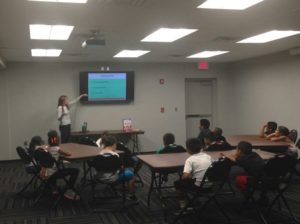 ld boy winked at me as I walked up to his table. Oy vey. I swiftly kicked him out. Now, I can appreciate the hilarity of this ‘compliment’ of sorts perhaps in another situation. Though maybe not one in which I am in a teaching position and am 10 years older than the giver of the wink. All of this was explained to him and he was allowed back in for the snack. [*cue awkward eye contact here*] You’d think he expected me to thank him. How are 11 year old boys so confident?? I had to talk to some of my guy friends here in Waco to attempt to glean some sort of understanding into the 11 & 12 year old male mind… as you may imagine I did not have much luck. They don’t even understand their own minds is the best I could come up with.
ld boy winked at me as I walked up to his table. Oy vey. I swiftly kicked him out. Now, I can appreciate the hilarity of this ‘compliment’ of sorts perhaps in another situation. Though maybe not one in which I am in a teaching position and am 10 years older than the giver of the wink. All of this was explained to him and he was allowed back in for the snack. [*cue awkward eye contact here*] You’d think he expected me to thank him. How are 11 year old boys so confident?? I had to talk to some of my guy friends here in Waco to attempt to glean some sort of understanding into the 11 & 12 year old male mind… as you may imagine I did not have much luck. They don’t even understand their own minds is the best I could come up with.
While some lessons left me laughing and shaking my head in wonder, others left me somewhat heartbroken. One day, at one of our three locations, I was tying a braided yarn bracelet this little lady had made in our activity part of the lesson that day. She looked up at my face and asked if I was wearing makeup, to which I replied “Yes, some mascara.” She then told me that she likes “the stuff that makes your skin lighter”. I asked if she meant foundation, the stuff that makes skin all even toned. She said yes… because she doesn’t like the color of her skin, it’s “too dark” she said. This sweet, beautiful, incredible, smart little girl told me she wished her skin was lighter. I needed a moment. I then told her that makeup like that is for hiding things and she had absolutely nothing to hide. I told her that her skin is beautiful, smooth, flawless. Now why in the world wasn’t she hearing this every day at home? Why??? We, unfortunately, are surrounded by things telling us, especially women and young girls, to compare ourselves to others, that the way we are just isn’t quite good enough. Improving ourselves in order to be healthier is one thing, disliking how God made us is another matter entirely. Negativity is everywhere. However, something I will take from these beautiful, fun-loving kiddos is, no matter what’s going on in my personal life or in the stress behind the scenes, I can still be happy, positive, and kind to those around me. I’ve learned that whether someone is struggling with their weight, causing chronic health issues or if their struggle is on the inside and they’re dealing with something along the spectrum of mental health, we can all be kind, take it seriously, and be aware of what a simple encouraging word can do for someone. I’ve learned how important education and spreading the word about the importance of being active every day are. I’ve learned how I can help people to learn how important it is to really understand the food we put in our bodies. And I’ve learned it doesn’t take too much to begin to make a difference.
It starts with kindness and encouragement. Throw in some fun, maybe versatile nutrition education, and some opportunities to come together and get active. We may just end up with a healthier, happier Waco for generations to come. I’m so thankful to the Public Health District and can’t wait to start the rest of my life, helping people, and trying to make a positive difference in their well-being.
Lots of love to you beautiful people.
 This Act Locally Waco blog post was written by Kaylyn Schultz. Kaylyn is originally from Celina, Tx and is going into her senior year at Baylor University, majoring in Health Science Studies. After graduating in May of 2016 she plans to begin working toward obtaining her Master’s degree in Public Health. Kaylyn is also a high jumper for the Baylor Track and Field team and loves the challenge, teammates, discipline, and Christian atmosphere being a part of such an incredible team provides. Kaylyn can usually be found reading any book she can get her hands on or watching movies with friends, her stupendous little sister, Lauren, or her wonderful and supportive boyfriend, Marcus. Her main goal for her future career is to decrease the prevalence of obesity and resulting chronic disease in our nation and thus improve quality of life for millions of children and adults.
This Act Locally Waco blog post was written by Kaylyn Schultz. Kaylyn is originally from Celina, Tx and is going into her senior year at Baylor University, majoring in Health Science Studies. After graduating in May of 2016 she plans to begin working toward obtaining her Master’s degree in Public Health. Kaylyn is also a high jumper for the Baylor Track and Field team and loves the challenge, teammates, discipline, and Christian atmosphere being a part of such an incredible team provides. Kaylyn can usually be found reading any book she can get her hands on or watching movies with friends, her stupendous little sister, Lauren, or her wonderful and supportive boyfriend, Marcus. Her main goal for her future career is to decrease the prevalence of obesity and resulting chronic disease in our nation and thus improve quality of life for millions of children and adults.
The Act Locally Waco blog publishes posts with a connection to these aspirations for Waco. If you are interested in writing for the Act Locally Waco Blog, please email [email protected] for more information.
by Meilana Charles
With the weather in McLennan County regularly reaching 90 degrees or higher, staying hydrated is essential. Unfortunately for many people staying hydrated means the overconsumption of fruit juices or drinking sugary-carbonated beverages because water may lack a desired flavor.
Well, there’s a simple solution: Infused Water.
Infused Water is the combination of water with fresh fruits and herbs. For the past year I’ve been hooked on Infused Water. I’ve discussed the different recipes I’ve tried informally with several local groups, and I even created a mini-program about the benefits of drinking infused water that was presented at Restoration Haven, a local community ministry located in the Estella Maxey Public Housing complex, last year. Even children at several summer day camps have noticed the “leaves” (mint) floating around in my water.
I can’t take all the credit for my yummy discovery. Infused Water has been used as a refreshing drink in several cultures. According to Basu (2014), Infused Water may be a derivative of Aguas Frescas, a flavored drink popular in the Caribbean and in Central and South American countries.
Not only is Infused Water refreshing, it’s also healthy. Danielle Hairston-Greene, a Program Specialist with the Cooperative Extension Program wrote in her “What’s on My Plate” blog that, “There are many health benefits of infused water including appetite control, hydration, immune defense, heartburn prevention, blood sugar regulation and weight management.” Hairston-Greene even provided several combinations with their specific health benefits.
 Preparation of Infused Water is relatively easy. Once you decide which recipe to use simply cut up the fruit than use a fruit squeezer to extract the juice leaving the pulp. Next, add the juice to filtered water than let it sit overnight. I personalize my creations with fresh Ginger Root and Mint.
Preparation of Infused Water is relatively easy. Once you decide which recipe to use simply cut up the fruit than use a fruit squeezer to extract the juice leaving the pulp. Next, add the juice to filtered water than let it sit overnight. I personalize my creations with fresh Ginger Root and Mint.
Alternatively, some people prefer to cut up their fruits and add then them to the water. Infusion water bottles are also popular.
So the next time the Texas summer heat has you thirsty, pass on the soda, skip the sugar and use your imagination to think up a refreshing and nourishing Infused Water recipe for you and your family to fall in love with.
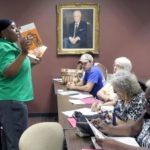 This Act Locally Waco blog post was written by Meilana Charles. Meilana is a Family and Consumer Sciences Extension Agent at Cooperative Extension Program at Prairie View A&M University. Meilana’s priority areas for providing educational resources to McLennan County are general nutrition, money management and parenting. She has a M.S. in Child Development from Texas Woman’s University and is a certified Human Development and Family Studies professional through American Association of Family and Consumer Sciences.
This Act Locally Waco blog post was written by Meilana Charles. Meilana is a Family and Consumer Sciences Extension Agent at Cooperative Extension Program at Prairie View A&M University. Meilana’s priority areas for providing educational resources to McLennan County are general nutrition, money management and parenting. She has a M.S. in Child Development from Texas Woman’s University and is a certified Human Development and Family Studies professional through American Association of Family and Consumer Sciences.
The Act Locally Waco blog publishes posts with a connection to these aspirations for Waco. If you are interested in writing for the Act Locally Waco Blog, please email [email protected] for more information.
Sources:
- Basu, B. D. (2014). Beat the Heat by Gulping Fruit Infused Water Drink. Positive Health,(218),
- Hairston-Greene, D. (2014) The Health Benefits of Infused Water. What’s on My Plate blog.
By Crystal Hernandez
May 2, 2015. Pacquiao vs. Mayweather. Billed as the Fight of the Century, this matchup was expected to be the highest-grossing match in history. The revenue from pay-per-view purchases alone proved that it was. Some might argue that the fight was less than expected.
I’m here to tell you, though, a fight bigger transpires every day. Imagine you are standing in one corner of the ring. As your opponent climbs through the ropes, you find yourself eye to eye with cancer. That’s right. You’re up against the big “C.” That’s the fight of your life, but you don’t have to fight it alone. LIVESTRONG® at the YMCA is right beside you, gloves on and ready to help you overcome your opponent.
Punch one: Cancer steals your peace and rocks your world. Punch two: Cancer takes away your hair, your breast, your endurance, your stamina, your energy, and your self-esteem. Punch three: Cancer staggers your family, destroys your finances and leaves your head spinning while you’re clinging to the ropes with all you’ve got.
Advances in medicine help many claim victory. However, the battle leaves the champion black and blue, tired and broken. When the fight is over, supporters and fans move on, leaving survivors alone to figure out what happens next in their stories. In the quiet that follows, survivors are left searching for a “new” normal. LIVESTRONG at the YMCA can help.
LIVESTRONG at the YMCA steps in to be the Creed to your Rocky helping you reclaim your health and wellness. The free program improves endurance, stamina, strength, balance and flexibility. You find a new group of fans in the survivors that join you, and emotional healing occurs. The twice-a-week 90-minute sessions help develop better health through cardiovascular and weight machines, free weights, resistance bands and modified classes. Two specially trained instructors take you under their belts to show you the “ropes”.
Support continues after each 12-week session with LIVESTRONG at the YMCA Nights. Survivors and caregivers reunite with other participants and take part in fun activities, such as belly dancing, bunco and visits to the theater.
If you are a cancer survivor and would like more information about the next session, contact Chronic Disease Prevention Specialist Crystal Hernandez at (254) 776-6612 or [email protected]. If you would like to show your support, sign up for the LIVESTRONG at the YMCA Race. The 4th annual event will be Oct. 3, 2015, at Woodway Park. Sign up for the 1K, 5K or 10K via Active.com or at the Welcome Desk at Waco Family YMCA. Sponsorship opportunities are available. Donations can be made directly to the Y to support the LIVESTRONG at the YMCA.
LIVESTRONG at the YMCA is our way of making sure no one fights cancer alone. When cancer throws a blow to you or a loved one, the Y can help pick you up, dust you off and give you the strength and endurance to come back swinging. Together, we can take back what cancer takes away.
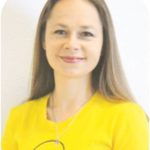 This Act Locally Waco blog post was written by Crystal Hernandez. Crystal is the Chronic Disease Specialist for the Waco Family YMCA. She received her degree in Exercise Science and Health Promotion from the University of Memphis. She and husband Shawn are blessed to be the parents of 4 beautiful children. In her free time, she loves hitting the pavement and pounding out a good run.
This Act Locally Waco blog post was written by Crystal Hernandez. Crystal is the Chronic Disease Specialist for the Waco Family YMCA. She received her degree in Exercise Science and Health Promotion from the University of Memphis. She and husband Shawn are blessed to be the parents of 4 beautiful children. In her free time, she loves hitting the pavement and pounding out a good run.
The Act Locally Waco blog publishes posts with a connection to these aspirations for Waco. If you are interested in writing for the Act Locally Waco Blog, please email [email protected] for more information.
By Katherine Landgrave
What is preconception health? A couple of years ago, if I had looked at this word I would have probably focused on the conception part and would have been terrified at the word. As a 22 year old in graduate school, the idea of having a child is the furthest thing from my mind. I am a huge planner and have my next five years all mapped out. However, if there is anything I’ve learned from life, it’s that life tends to throw curve balls at you and things don’t always go according to plan. For instance, did you know that over half of pregnancies in the US are not planned? Of course no expects to have an “unplanned” pregnancy, but obviously it happens quite frequently. While having children is not a part of my five year plan, I need to remember that my plan isn’t always what will really happen.
So again, what exactly is preconception health? Preconception health refers to the health of women and men during their reproductive years, when they can have a child. So it’s a broad area of health that covers any woman or man during childbearing age. I think one of the things that surprised me most about this definition is that preconception health isn’t just about women, but about men too. Preconception health is about making sure women and men are becoming healthier for their future and for the future of their children.
For women, preconception health isn’t just about a woman’s pregnancy or planning for one. It means choosing healthy habits today, so that you will have a healthier life. It means planning for your future and taking steps to make that future a reality.
Preconception health for men is about staying healthy too. That may mean being active so you can be there for your children one day and protect them, or it may mean encouraging and supporting the health of your partner. It means being able to be healthy enough to provide for yourself and your family one day.
Preconception health is also about the health of our babies. The United States has some of the worst birth outcomes among developed countries. I know that I don’t want my future children to be born premature or to have any complications, so I want to do everything I can do today to protect the future of my children someday down the line.
So what can we do to focus on preconception health? Texas has started a campaign called “Someday Starts Now” that focuses on this exact topic. On their website www.somedaystartsnow.com they provide information for men and women in every life phase. They have different categories like “I don’t want or can’t have children”, “I’m not sure if I want children”, “I want to have a baby someday”, “I’m expecting a baby now”, “I’m already a mother”, “I’m finished having babies”, and even “My partner and I have lost a pregnancy or baby.” These seven categories cover a wide variety of life’s situations and provide tips on how to have a healthy body, healthy environment, and healthy mind. This campaign does a great job of getting women and men to start thinking about their future and making life plans for themselves.
One of my favorite parts of the campaign is the “life planning tool”.
In it you identify your goals for the future and write out how you are going to achieve those goals. This is something every woman should fill out today. As I mentioned before, I like outlining my plans. This tool helps me align my five year plan with my health goals and family plan. It starts me on the path to make sure the future is bright for the family I plan to have.
I’ve been working with the Healthy Babies Coalition and preconception health for four months now and I’ve come to realize how important it is for women and men everywhere. I don’t want to have a child right now, but I do want to have healthy children someday. Now I realize that I need to start taking care of myself today so I can bring a perfect little being into a healthy world someday in the future.
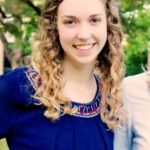 Katherine Landgrave is a graduate assistant for the McLennan County Public Health Department working with the Healthy Baby Coalition. She is also a graduate student at Baylor University working on her master of in public health. Katherine has a passion for working in the community and through this position has found an interest for working with maternal and child health. She hopes to one day go to medical school and continue helping improve birth outcomes and the overall health of all women.
Katherine Landgrave is a graduate assistant for the McLennan County Public Health Department working with the Healthy Baby Coalition. She is also a graduate student at Baylor University working on her master of in public health. Katherine has a passion for working in the community and through this position has found an interest for working with maternal and child health. She hopes to one day go to medical school and continue helping improve birth outcomes and the overall health of all women.
The Act Locally Waco blog publishes posts with a connection to these aspirations for Waco. If you are interested in writing for the Act Locally Waco Blog, please email [email protected] for more information.
by Crystal Melton
Four weeks ago I welcomed baby number four into my arms and into the world. I’m biased, but this little person that I’ve been given the privilege to raise is absolutely perfect. However, I realize that feeling is universal among parents. We gaze in awe at the unblemished miracle we’ve been given, and, with the best of intentions to maintain that perfection, we make lofty promises in an effort to keep that child as healthy and well as we can.
Promises like “I’ll never let the television babysit my child” or “I will never feed my child fast food.” And sometimes the promises aren’t about what we’ll never do, but what we’ll always do. “I’ll always take time to play hide-and-seek with my child” or “I’ll always find time to push my child on the swing.”
I’ve made those same promises. I don’t know about you, but life and the chaos that it brings seem to always get in the way. I’ll admit it: I’ve counted on cartoons to occupy my children on more than one occasion, and, yes, a trip through the drive thru has rescued us more than once. And, sadly, at times work expectations have come between me and that game of hide-and-seek with my child.
Parents, you’re not alone. We all have the best of intentions with our children, but sometimes we don’t quite accomplish what we set out to do. An occasional upset to those promises probably won’t derail their health, but a constant lifestyle of those choices definitely could begin to send your child down the path of poor health. Although we don’t need to beat ourselves up about it, we do need to open our eyes and see what’s happening to our kids and their health and begin to reapply ourselves to those goals we may have once set.
According to the Centers for Disease Control, in 2012 one in three adolescents was overweight or obese. The reality surrounding those numbers is sobering because what we are seeing with this increase in bodyweight is an increase in risk factors for heart disease in our youth, such as high cholesterol and high blood pressure. This increase in body mass also puts them at risk for prediabetes, bone and joint problems, sleep apnea and poor self-esteem. And all those risks are present right now during their youth- in the past, these problems didn’t occur until people aged! Today’s kids head into adulthood ahead of the curve when it comes to being at risk for heart disease, diabetes and some forms of cancer.
After you’ve digested that, let me reassure you that we can help our kids get their health back on track. It’s not too late to help lead your child to a life of health and well-being. Programs, such as MEND, can help you and your child learn to change behaviors and make healthier choices. MEND (Mind, Exercise, Nutrition, Do It!) is a free 10-week program that meets twice a week that helps children ages 7-13 who are above their healthy body weight learn about nutrition, physical activity, goal setting and more. Together, parent and child move through an engaging research-based curriculum that not only educates the family but also often reduces tension and stress at home surrounding food and activity. The lessons include fun, thought-provoking activities, like a supermarket tour where kids get to be MEND detectives, finding healthy food options on the shelves of the grocery store. Each meeting also includes a fun, progressive, noncompetitive, game-based physical activity session. Another one of the endearing things about this program is that you’re diving into this material and making these lifestyle changes with other families that are struggling to be healthy, too. There is support, accountability and shared ideas among parents and children.
Finding the help you and your child are looking for is no farther than the YMCA of Central Texas. The MEND program is offered several times throughout the year. Space is limited, though, so you’ll want to sign up soon. Remember: lots of parents just like you want a healthier future for their child. For more information call the DORIS MILLER FAMILY YMCA at 254 752 1605 or WACO FAMILY YMCA at 254 776 6612.
 This Act Locally Waco blog post was written by Crystal Hernandez. Crystal is the Healthy Living Director for the Waco Family YMCA. She received her degree in Exercise Science and Health Promotion from the University of Memphis. She and husband Shawn are blessed to be the parents of 4 beautiful children. In her free time, she loves hitting the pavement and pounding out a good run.
This Act Locally Waco blog post was written by Crystal Hernandez. Crystal is the Healthy Living Director for the Waco Family YMCA. She received her degree in Exercise Science and Health Promotion from the University of Memphis. She and husband Shawn are blessed to be the parents of 4 beautiful children. In her free time, she loves hitting the pavement and pounding out a good run.
The Act Locally Waco blog publishes posts with a connection to these aspirations for Waco. If you are interested in writing for the Act Locally Waco Blog, please email [email protected] for more information.
By Donna McKethan
In the Fall of 2015, the Greater Waco Advanced Health Care Academy (GWAHCA) will open its doors to Waco area juniors and seniors who are interested in pursuing a career in the health care industry. The Greater Waco Advanced Health Care Academy is a unique and innovative collaboration between the local health care community and Waco Area School Districts. GWAHCA will create a challenging learning environment that encourages high expectations for student success in the Health Care Field. The academy will empower students to successfully be competitive and workforce ready in our community and a global society.
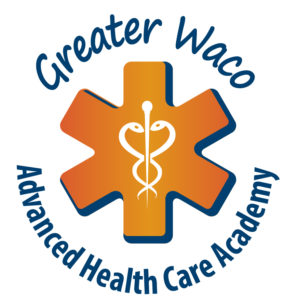 GWAHCA follows a model similar to the Greater Waco Advanced Manufacturing Academy, which aims to give students a head start in careers in welding and manufacturing. Officials from area school districts, McLennan Community College, Texas State Technical College and area health care industry leaders have been meeting over the last two years to determine health care industry needs and how to best serve students. The twin philosophies of realism and experimentalism are embedded in the attitudes and beliefs behind the planning and remodeling of GWAHCA. These philosophies have been expressed by the members of the GWAHCA Executive and Steering Committees. The idea behind not only the curriculum but also the facility is to give students an experience that aligns with what they will encounter when they graduate and begin a career in the health care industry. Partners support GWAHCA, an academy that fosters a sense of community among students, staff, parents, partners and neighbors. GWAHCA students will develop a sense of self-esteem and respect for themselves and others. Through a diverse and challenging curriculum, focusing on basic science, GWAHCA will cultivate student interest in various sciences and health professions. GWAHCA will provide a quality education and experiences that will prepare students to develop the academic, social and personal qualities necessary to realize their fullest potential as lifelong learners and productive, caring citizens of the world.
GWAHCA follows a model similar to the Greater Waco Advanced Manufacturing Academy, which aims to give students a head start in careers in welding and manufacturing. Officials from area school districts, McLennan Community College, Texas State Technical College and area health care industry leaders have been meeting over the last two years to determine health care industry needs and how to best serve students. The twin philosophies of realism and experimentalism are embedded in the attitudes and beliefs behind the planning and remodeling of GWAHCA. These philosophies have been expressed by the members of the GWAHCA Executive and Steering Committees. The idea behind not only the curriculum but also the facility is to give students an experience that aligns with what they will encounter when they graduate and begin a career in the health care industry. Partners support GWAHCA, an academy that fosters a sense of community among students, staff, parents, partners and neighbors. GWAHCA students will develop a sense of self-esteem and respect for themselves and others. Through a diverse and challenging curriculum, focusing on basic science, GWAHCA will cultivate student interest in various sciences and health professions. GWAHCA will provide a quality education and experiences that will prepare students to develop the academic, social and personal qualities necessary to realize their fullest potential as lifelong learners and productive, caring citizens of the world.
The first programs to be offered at GWAHCA will be the Certified Nursing Assistant (CNA) and Advanced CNA programs. The CNA curriculum will follow the current program offered at McLennan Community college. The Advanced CNA course is being developed in collaboration with Providence and Baylor Scott and White (Hillcrest) Hospital Staff. This curriculum development is an exciting process and will result in an amazing and rigorous program. In addition to the CNA course, juniors will also take Anatomy & Physiology, Counseling and Mental Health and Medical Terminology. Seniors (who have completed the CNA certification) will take Phlebotomy and a soft skills course that will include training in the hospitals computer system. Both hospitals have promised to hire all students who successfully complete the Advanced CNA program.
GWAHCA will be located on the campus of the former Viking Hills Elementary school. The campus is located on Viking Drive just off Fish Pond Road. All Juniors and Seniors within 45 minutes of the academy are eligible to attend. Applications are currently being accepted. For more information, contact Donna McKethan (254 755 9573 or [email protected])
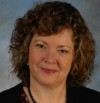 This Act Locally Waco blog post was written by Donna McKethan. Donna is the Career and Technology Director at Waco ISD. She has 33 years in education, the last 15 with WISD Career and Technology. She is currently the President of The Career and Technology Association of Texas. She is a WISD graduate with a BS in Home Economics Education from Baylor University and an MS of Education from Tarleton State University. She is currently enrolled in the Doctorial Program in Educational Leadership at Tarleton State University.
This Act Locally Waco blog post was written by Donna McKethan. Donna is the Career and Technology Director at Waco ISD. She has 33 years in education, the last 15 with WISD Career and Technology. She is currently the President of The Career and Technology Association of Texas. She is a WISD graduate with a BS in Home Economics Education from Baylor University and an MS of Education from Tarleton State University. She is currently enrolled in the Doctorial Program in Educational Leadership at Tarleton State University.
The Act Locally Waco blog publishes posts with a connection to these aspirations for Waco. If you are interested in writing for the Act Locally Waco Blog, please email [email protected] for more information.
by Christian Bolaños
“Baylor Bubble” [ bā-lər ˈbə-bull ] – Noun: A thin sphere enclosing Baylor University and living areas immediately surrounding its campus, from the rest of Waco.
Baylor was my dream school in the sense that it was out of my reach. But, like many who attend, I have parents that work day in and day out to give their children an opportunity to live a life they could only dream of. That, along with financial aid and academic scholarships, has kept me enrolled all four years.
The hefty Baylor price tag pays for a phenomenal faculty and a seemingly limitless number of opportunities waiting to be tapped by students eager to make a difference in the world. Baylor does an outstanding job at educating its students in their respective professions, and does so in such a way that students keep integrity and ethics ever-present and in the forefront of students’ minds. Baylor University’s course offerings include business ethics courses and an entire Medical Humanities degree program. Baylor’s Law School even includes “a study abroad program devoted to the art of advocacy” to ensure that Baylor attorneys represent the interests of their clients in the best manner possible.
There is, however, one inconsistency in all of this. As students we learn all kinds of skills out of textbooks filled with different scenarios, simulations and situations that are supposed to reproduce real life. I believe it’s a great way of teaching; it’s only missing one thing. Real life.
One of my professors offered a solution to this dilemma. We learned to call it “service-based learning,” and it made the biggest impact on me during my entire time in Waco. Despite all of the brilliant professors, state of the art facilities, and wonderful resources available on campus, one of the best, and most underappreciated opportunities that Baylor has to offer us as a valuable teaching lesson lies a few steps right outside of the “Baylor Bubble.”
I strongly believe that community service is the missing link for students. It gives us the chance to apply what we’ve learned in the classroom to real human needs. By breaking down the barrier between Baylor and Waco, we were able to more fully engross ourselves as citizens of Waco and better understand the dynamics of the city. The best thing that students can do during their time at Baylor is to participate as active members of the Waco community. For example, in one class I took, we not only learned the importance of grant writing, but we were actually able to apply for real world grants and actually help non-profit organizations in the area. Nearly every course could be tailored to include some form of service-based learning. I would urge those of you that are in school to come up with ideas with your teacher/professor on how you can take the learning outside of the classroom and do some form of work, no matter how big or small, that leaves an impact beyond that of a letter grade. And for those of you who are not in a classroom, find a place where you can serve. Even if you can only commit to an hour a week, there are plenty of places where you can make a world of difference.
I have gotten involved in the Waco community through an internship at the Public Health District. Through this involvement I have learned first-hand about the health challenges that many cities face such as a shortage of family practice doctors and lack of access to care among lower income neighborhoods. I have also learned about the things a city can do to promote the health of its citizens, like creating programs and coalitions that serve to raise awareness and educate the general population on health disparities. Because of this understanding I will be a better, more informed citizen, whatever profession I end up pursuing and where ever I end up living. I consider this an extremely valuable part of my education, something that I wouldn’t have been able to experience had I not made the effort to work outside the Baylor Bubble.
Here is how Baylor’s strategic vision, Pro Futuris (“for the future”), describes Baylor’s role as an institution of higher education: “We strive to prepare students to make a difference in our world as citizens and leaders who have the faith and integrity to do what is right in the face of competing pressures and to have a passion to apply their knowledge to ends that transcend mere self-interest.”
Rather than only venturing out to Waco to grab a bite to eat or enjoy the nightlife, we should actively seek out opportunities for not only our growth, but also for the growth of Waco. It should be our duty as citizens to do our part and work towards building a better future. So start early and start now. It is never too late to begin making a difference in your community. And rather than being like the dreadful, monthly visit to the in-laws, community service should be something you (and hopefully your family or close group of friends, the more the merrier!) look forward to doing when you meet up. There are so many different ways to give time, each with its own positive impact on our community. Find something that you like. For a list of ways to serve Waco, click the following link http://www.waco-texas.com/volunteer.asp. Thank you.
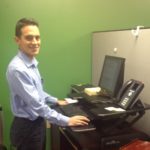 This Act Locally Waco blog post was written by Christian Bolaños. Christian is an intern at the Waco Public Health Department and a senior at Baylor University. His interests range from biology research and technical writing, to learning more about his rich Latino culture. Focused on helping the community as a whole, Christian ultimately plans to matriculate to medical school to become a surgeon. In the meantime, he plans on graduating in May and either pursue research interests or obtain a writing position in the medical field.
This Act Locally Waco blog post was written by Christian Bolaños. Christian is an intern at the Waco Public Health Department and a senior at Baylor University. His interests range from biology research and technical writing, to learning more about his rich Latino culture. Focused on helping the community as a whole, Christian ultimately plans to matriculate to medical school to become a surgeon. In the meantime, he plans on graduating in May and either pursue research interests or obtain a writing position in the medical field.
The Act Locally Waco blog publishes posts with a connection to these aspirations for Waco. If you are interested in writing for the Act Locally Waco Blog, please email [email protected] for more information.
By Crystal Hernandez
Hi. It’s nice to meet you. We’re the YMCA of Central Texas.
Many folks in Waco have never been formally introduced to the YMCA of Central Texas. First impressions or chatter among friends often portray the Y as just another gym, a place to don spandex, pound out a mile or two on the treadmill, knock out a couple of reps on the weights or swim a few laps.
When you join the Y, though, you belong to more than a gym although we do have a great gym. When you join the Y, you join a community. We’re a gym with a mission — a mission to put Christian principles into practice through programs that build healthy spirit, mind and body for all. Our mission governs all we do. Here’s how.
We are for you. We are for your neighbor. We are for your child. We are for the healthy and those struggling to reclaim their health. We are for those that love spandex and those who hate it. We are for everyone. At the Y, a supportive community and friendships are a big part of wellness. At every age and every activity level, you’ll find people just like you looking to live a bit healthier.
If an expansive cardio and weight area are what you’re looking for, we have it. Between our two branches (Doris Miller Family YMCA and Waco Family YMCA) we offer more than 100 land-based group exercise classes each week. If you’re more of a water baby, we offer group exercise classes in our pools, too. (By the way, we have five pools). From Zumba® to yoga, from Insanity® to Aquatic Boot Camp, we have a class for everyone.
We don’t stop there, though. We believe that everyone is entitled to better health, and we want to help. Here are some examples of some of our special programming that helps build up the health of our community:
- LIVESTRONG® at the YMCA, a free 12-week program, helps adult cancer survivors reclaim their total health and find a community of support.
- Our children’s health is important, too. Kids ages 7-13 who are above their healthy body can enroll, along with their caregivers, in MEND (Mind, Exercise, Nutrition, Do it!). The dynamic and engaging curriculum of this free 10-week program guides kids toward healthier eating and a more active lifestyle.
- The safe, low-impact exercises of Enhance®Fitness improve endurance, strength, balance and flexibility among those with arthritis.
- The YMCA’s Diabetes Prevention Program is a 12-month lifestyle behavior intervention that is part of the CDC-led National Diabetes Prevention Program. It helps those at high risk of developing type 2 diabetes adopt and maintain healthy lifestyles by eating healthier, increasing physical activity and losing a modest amount of weight to reduce their chances of developing the disease.
Our friendly, knowledgeable staff members are guided by our core values of caring, honesty, respect and responsibility. We’re here to do more than help you reach your goals; we’re here to build a relationship with you. If you’re a gym rat, we’ll cheer you on! If you’re new to the fitness world, we’ll take time to get to know you while guiding you in achieving your goals.
And do you want to know one of the most amazing things about the Y? It’s for everyone! The generosity of others is at the core of our existence. It is only through the support of our volunteers and public and private donors that we are able to give back to the communities we serve. We offer financial assistance so that cost is not a barrier to anyone wanting better health. The Y is for community. The Y is for you. You should get to know us. We’d like to get to know you.
 This Act Locally Waco blog post was written by Crystal Hernandez. Crystal is the Healthy Living Director for the Waco Family YMCA. She received her degree in Exercise Science and Health Promotion from the University of Memphis. She’s blessed to be the mother of 3 beautiful children, Norah, Robbie and Sammie and she and husband, Shawn will be adding number 4 to the mix in less than a month. In her free time, she loves hitting the pavement and pounding out a good run.
This Act Locally Waco blog post was written by Crystal Hernandez. Crystal is the Healthy Living Director for the Waco Family YMCA. She received her degree in Exercise Science and Health Promotion from the University of Memphis. She’s blessed to be the mother of 3 beautiful children, Norah, Robbie and Sammie and she and husband, Shawn will be adding number 4 to the mix in less than a month. In her free time, she loves hitting the pavement and pounding out a good run.
The Act Locally Waco blog publishes posts with a connection to these aspirations for Waco. If you are interested in writing for the Act Locally Waco Blog, please email [email protected] for more information.
by Kelsey Miller
Do you eat paleo? Primal? Local? Organic? Gluten-free? Refined sugar-free? Vegetarian? Pescatarian? Vegan? South Beach Diet? Atkins? Hunter-gatherer? Fast food junkie?
 Or are you overwhelmed by what appears to be an ever-evolving set of messages about what is healthy, what our bodies were created to eat, and how to make good food choices? Americans are inundated with messaging that tells us we’re never getting it quite right with food, even as we are sold the “silver bullet” to good health and nutrition. As a nation, our diet-related health outcomes are worse than ever. Healthy eating enthusiasts have, at turns, said fat was making us fat, and then reversed that decision. It’s healthier to avoid meat, or it’s healthier to eat lots of meat. Carbs are the enemy; whole grains are essential to good health. Sugar is the devil; sugar is not really so bad in moderation. All of these developments and disagreements have emerged in just the past few decades or so. Even for the conscious consumer with enough income for flexibility in choice, the sheer number of choices and the ever-increasing volume of conflicting information is maddening.
Or are you overwhelmed by what appears to be an ever-evolving set of messages about what is healthy, what our bodies were created to eat, and how to make good food choices? Americans are inundated with messaging that tells us we’re never getting it quite right with food, even as we are sold the “silver bullet” to good health and nutrition. As a nation, our diet-related health outcomes are worse than ever. Healthy eating enthusiasts have, at turns, said fat was making us fat, and then reversed that decision. It’s healthier to avoid meat, or it’s healthier to eat lots of meat. Carbs are the enemy; whole grains are essential to good health. Sugar is the devil; sugar is not really so bad in moderation. All of these developments and disagreements have emerged in just the past few decades or so. Even for the conscious consumer with enough income for flexibility in choice, the sheer number of choices and the ever-increasing volume of conflicting information is maddening.
How has our culture so deeply complicated one of the simplest and most basic human activities – eating? Writers much more skilled than I have contemplated these big questions at great length – check out Michael Pollan, Marion Nestle, Raj Patel, and Michael Bittman if you want to read more. But I’m more interested in this issue at the practical level – we are inundated by information (and misinformation) about healthy eating; how then shall we live? How can Waco become a better place for all people to eat and thrive, even when we don’t have all the right definitions or answers?
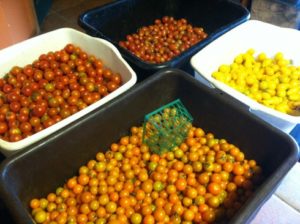 Let me be the first to admit, I am overwhelmed. I love fresh fruits and veggies, try to eat only meat, fish, and dairy raised ethically, and have had the privilege of growing my own food (and food for my community) as a former produce intern at World Hunger Relief, Inc. And yet…
Let me be the first to admit, I am overwhelmed. I love fresh fruits and veggies, try to eat only meat, fish, and dairy raised ethically, and have had the privilege of growing my own food (and food for my community) as a former produce intern at World Hunger Relief, Inc. And yet…
And yet I still frequently find myself at a loss for what to eat in a pinch, how to make good choices with limited time and energy, and how to consistently make healthy food culture a part of my life. I often fail to eat healthy. I often struggle with this question of, do I have to eat healthy at all times in order to recommend it in the community at large? My professional mission – which interweaves with my personal mission in many ways – is to advocate for and strengthen programs and policies which increase children’s access to healthy foods. What if as advocates we were more open about the fact that none of us – or at least very few – get it all right when it comes to healthy eating?
Occasionally, I’ll try an experiment where I ask people from different backgrounds how they define healthy eating or good nutrition. In my limited, unscientific experience, very few people answer with any real confidence, regardless of their education or income level.
If you’re a student, how many times in the last month have you gone to a class or meeting and been offered free candy, cookies, or donuts?
If you’ve visited a food pantry recently, how much of your box was full of canned and packaged goods, with long ingredient lists, and few whole, fresh items?
If you’re working and attend many meetings, how many lunches have you been to recently where barbecue, meat-heavy dishes, or fast food was offered?
I do not seek to demonize any of these choices and realities (I have a particular weakness for Reese’s Peanut Butter Cups…), but rather to suggest, aren’t we all kidding ourselves if we think only folks with low incomes struggle to make healthy food choices on a regular basis? Whether it’s the tyrant of Too Busy or the tyrant of Too Much Information, many of us feel helpless in our knowledge of what is truly healthy food, and in our ability to acquire, prepare, and eat such foods.
As I write this blog post at my desk, I’ve finished my lunch of roasted sweet potatoes, black beans, and watermelon, all packed in a reusable, BPA-free container. But here’s the wrench: I washed it all down with a carbonated soda in a – gasp! – Styrofoam cup. Does this make me a bad person? Does the fact that I have an on-again, off-again relationship with soda even when I know it is bad for me make my advice or recommendations moot?
 If all of us “food people,” as I sometimes hear myself referred to around town, opened up about our own struggles to make healthy choices, I wonder if it might change the conversation. Would that vulnerability welcome more folks into the conversation about how to ensure all have access to healthy food? I am convinced that it is not people with low-incomes alone who need “education” on nutrition and healthy eating, as I so often hear well-intentioned people say. It is all of us. Despite cleverly curated Pinterest boards, how many of us really know how to cook simple and healthy meals anymore, or feel like we can make a healthy choice under pressure at most restaurants? What if we could embark on a journey of healthy eating all together, as a community, instead of drawing arbitrary lines in the sand about who needs education and support? Because if I’m being honest, that neon fast food sign looks pretty appetizing during my short lunchtime…and I, too, need encouragement and solidarity from my community to make better choices.
If all of us “food people,” as I sometimes hear myself referred to around town, opened up about our own struggles to make healthy choices, I wonder if it might change the conversation. Would that vulnerability welcome more folks into the conversation about how to ensure all have access to healthy food? I am convinced that it is not people with low-incomes alone who need “education” on nutrition and healthy eating, as I so often hear well-intentioned people say. It is all of us. Despite cleverly curated Pinterest boards, how many of us really know how to cook simple and healthy meals anymore, or feel like we can make a healthy choice under pressure at most restaurants? What if we could embark on a journey of healthy eating all together, as a community, instead of drawing arbitrary lines in the sand about who needs education and support? Because if I’m being honest, that neon fast food sign looks pretty appetizing during my short lunchtime…and I, too, need encouragement and solidarity from my community to make better choices.
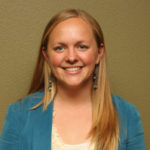 Kelsey Miller blogs for Act Locally Waco about Food Security and related issues. She is a Child Hunger Outreach Specialist at Texas Hunger Initiative’s Waco Regional Office. Kelsey is also a team member for the CHAMPS grant. The CHAMPS project aims to equip city leaders, anti-hunger groups, and the broader community to more effectively combat child hunger with the help of summer and afterschool meal programs.
Kelsey Miller blogs for Act Locally Waco about Food Security and related issues. She is a Child Hunger Outreach Specialist at Texas Hunger Initiative’s Waco Regional Office. Kelsey is also a team member for the CHAMPS grant. The CHAMPS project aims to equip city leaders, anti-hunger groups, and the broader community to more effectively combat child hunger with the help of summer and afterschool meal programs.
The Act Locally Waco blog publishes posts with a connection to these aspirations for Waco. If you are interested in writing for the Act Locally Waco Blog, please email [email protected] for more information.
- « Previous
- 1
- …
- 8
- 9
- 10

